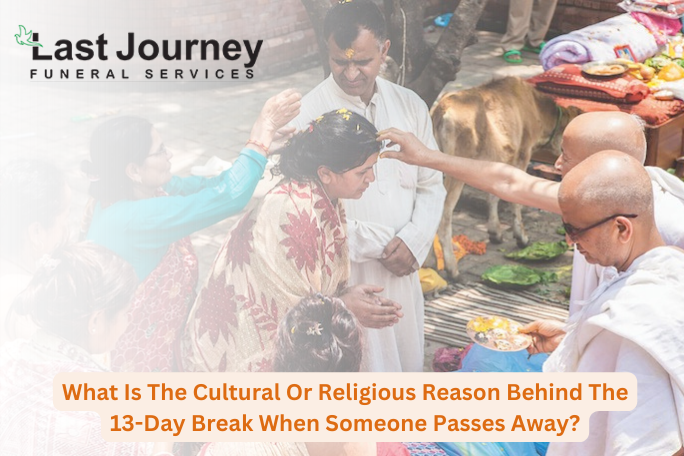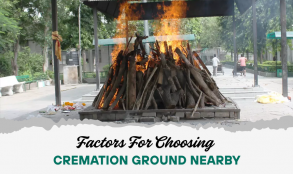Lastjourney Blog
What Is The Cultural Or Religious Reason Behind The 13-Day Break From The Worship Of God When Someone Passes Away?

 Table of Contents
Table of Contents- Why the family & lead mourner should take a 13-day break from worshiping after demise?
- What is the scientific cause behind the prevention of worshiping the deities at home or temples after the demise of a close family member?
The concept of abandoning worshiping God for thirteen days is followed rigorously in each sect of the Hindu Religion. It is recognized by the "13 days mourning period" after the demise of a close family member. The period initiates immediately after the traditional & dignified cremation of the departed body and ends with the "Shanti Path & Teheravin" ritual.
According to the proven information mentioned in the holy Hindu Vedic Scriptures, the painful duration of these tough 13 days is recognized as "Sutak" in the family who has lost a beloved family member.
During these mourning days, the lead mourner and other family members follow a determined set of rules. It includes avoiding visiting any auspicious event like marriage, visiting temples, wearing shiny & dark clothes, and eating spicy food items etc that vary from person to person. However, the prohibition of worshiping idols and chanting sacred prayers is mandatory in the Hindu religion for a complete 13-day period.
Why the family & lead mourner should take a 13-day break from worshiping after demise?
Here are the religious and cultural beliefs that strengthen the "break from worshiping of Hindu Gods or Deities" for 13 days after cremation.
- It is believed that the departed soul seeks salvation during these 13 days and has a tough time, the family members should leave all the sources of comfort. Worshipping God and chanting peaceful prayers are also considered a massive source of comforting our inner souls hence it should be abandoned for 13 days.
- Another reason accepted by the well-learned priests of the Hindu religion is, that "the departed soul finds it difficult to separate itself from the rest of the family members and grieve. Therefore we should pray for the comfort of the grieving soul not for ourselves through worshiping Hindu Gods."
- During these 13 days, it is advised to recite and listen to the preaching mentioned in the "Garun Puran" for the peace & salvation of the departed soul as well as to comfort yourself for overcoming the unbearable loss.
- According to the Hindu Vedic rituals, the painful period of 13 days is considered nonsacred for the worshipping of God. Therefore the family of the deceased should not touch any scripture and perform auspicious acts at home.
- Worshiping of God or Hindu Idols depicts the contradiction with grieving for the deceased person. It is prohibited to perform both practices simultaneously according to the beliefs of the Hindu religion.
What is the scientific cause behind the prevention of worshiping the deities at home or temples after the demise of a close family member?
The death of a family member can be due to any long-term contagious disease, sickness or sudden accident. If the family members perform any religious gathering at home or visit any nearby or remote temple for worshiping deities, the infectious disease can be spread among a large number of fellow devotees.
This is why the lead mourners are advised to avoid any religious gatherings, holy public ceremonies, and organization of any sacred event at home.
Which rituals take place at the deceased's home instead of worshiping the deities?
According to the most ancient Hindu religious beliefs, the emancipation of a departed soul begins right after the demise and the journey of complete salvation approaches the conclusion at the end of the 13th day.
Take a look at what ritualistic practices take place at the home of the deceased person.
Day 1 - Cremation or Funeral Ritual -
On the very first day of the mourning period, the lead family member performs a dignified cremation of the deceased body and helps the soul leave its physical identity and initiate the process of the eventual oneness with the divine universe.
On this day, the closest family members, relatives, friends, neighbors and other well-wishers join the cremation ritual and console the mourners. All the attendees pray for the peaceful salvation of the soul.
Day 2 & 3, the initial mourning days -
The entire close family of the deceased person starts the adoption of simple clothes, simple food and prevention from any auspicious & jovial gathering or events. Known people visit the home of the departed person and pay condolences to the mourning family members.
Day 4 to 9, Narration of Garun Puran -
A well-learned Hindu priest is invited to the home of the deceased person to narrate the preaching of 'Garun Puran' and convey the abstract of the entire life cycle to the mourners. All the family members attend the sessions of 'Garun Puran' narration and enlighten themselves with the spiritual path of salvation that a departed soul takes after death.
Day 10, Daswaan -
On the tenth day, a specific Havan & Puja is conducted at the home of the deceased person. In some sects of Hindu religion, the 10th day is considered as the Shradha ritual day. The food is offered to the crow, cow and dog while remembering all the ancestors of the family.
It is beloved that on the tenth day, the departed soul enters the other world or other life and gets freedom from the previous attachments.
Day 11, Ekadasha or Gyarahwan -
In some families, on the eleventh day after the demise of a family member, the immersion of his/her ashes is performed into the holy Ganga river. While some families host a gathering of eleven brahmins for a simple meal ritual. These brahmins are offered meals and other essentials like clothes, utensils and some cash known as "Dakshina". These brahmins pray for the peace and comfort of the departed soul and bless the lead mourner who is performing all the final rites of the deceased person.
Day 12, Tarpan -
The tarpan ritual is performed on the 12th day after demise. It is the water offering to all the ancestors of the family including the new soul that departed from the family a few days back.
Day 13, Teheravin Sanskaar & Shanti Path -
The 13th day is the final day of the long mourning period. A Hindu priest known as 'Mahapatra Brahmin' conducts some specific Hawan and Shanti Path rites at home and leaves after blessing the lead mourner.
After the Hawan and Path, the deceased's family host a grand ceremony known as 'Teheravin Bhoj'. All the relatives, family members, friends and close neighbors are invited to this ceremony. But first, the 13 Brahmins consume the meal and receive the offerings provided by the family.

What additional activities are prohibited to practice along with worshiping the deities at home during the 13 days?
Though the Hindu religion's beliefs are quite diversified and each sect follows a unique set of religious values & beliefs, a few activities remain the same in all the sects, subsects, castes and creeds of the Hindu religion.
Take a glimpse of nonacceptable activities during the mourning period besides worshiping deities at home.
- Any kind of cleansing ritual of a traditional bath is prohibited for the lead mourner and other close family members. The reason behind its prevention is that the cleansing denotes the ending of the mourning phase.
- The act of charity and donation in the name of the deceased person's peace is not allowed during the 13 days according to Hindu religious beliefs. The family can practice it after concluding the mourning period.
- Taking part in any kind of auspicious ceremony like marriage, Satsang, festival and parties for 13 days is not acceptable in the Hindu religion. It is believed that if a person belonging to the mourning family participates in any sacred gathering, the transmission of negative energies can harm society.
- Wearing fancy and flamboyant dresses, consuming spicy & nonveg food items and hosting any joyful event are not allowed for the family of the departed soul. It can discomfort the departed soul.
Also Read, What to Say When Someone Dies
Also Read, Things to Know Before Transporting a Dead Body Internationally
Your email address will not be published. Required fields are marked *












